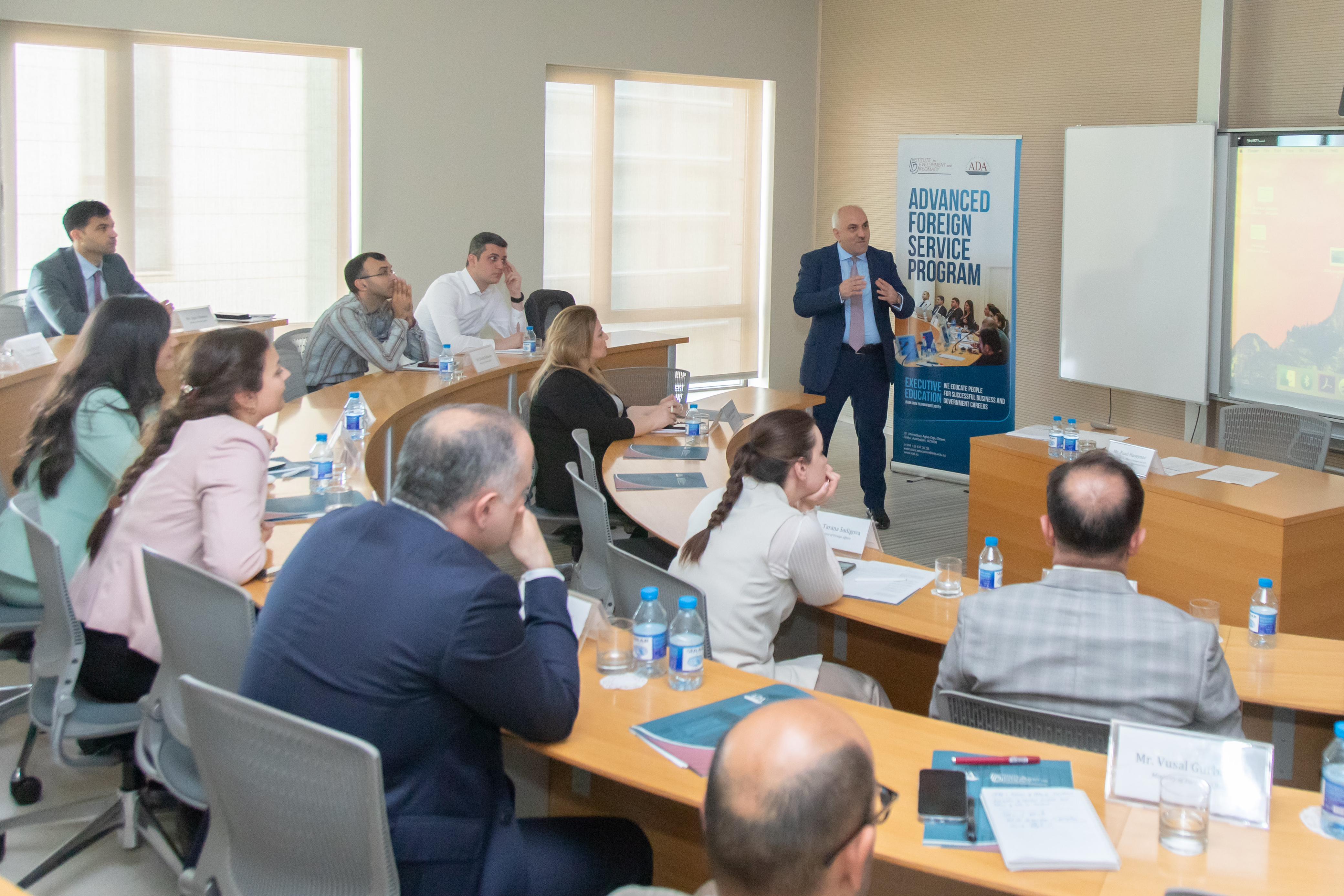
As part of the “Advanced Foreign Policy Program for Diplomats” jointly organized by the Ministry of Foreign Affairs of the Republic of Azerbaijan and the Institute of Development and Diplomacy (IDD) of ADA University, Fuad Huseynov, the Deputy Chairman of the State Committee for Affairs of Refugees and Internally Displaced Persons, delivered a lecture to 20 diplomats at ADA University.
During the lecture, diplomats were provided with detailed information on the main directions of the state policy under the leadership of the country's top officials concerning work with refugees and internally displaced persons. The activities of the committee, the provision of 116 new modern residential complexes in more than 30 cities and regions of Azerbaijan for former refugees and internally displaced persons over the past 30 years, and one of the five main directions of the “Azerbaijan 2030: National Priorities for Social and Economic Development” - the Great Return to the liberated territories, were highlighted.
It was emphasized that refugees and internally displaced persons are surrounded by state care, with special attention from President Ilham Aliyev to improving the living conditions and social protection of these individuals. First Vice-President Mehriban Aliyeva has consistently shown sensitivity and effective support in addressing their problems.
The Deputy Chairman provided detailed information about the measures being implemented under the “First State Program on the Great Return to the Liberated Territories of the Republic of Azerbaijan” approved by the President on November 16, 2022. Within this framework, a project titled “Conducting a Sociological Survey Among Internally Displaced Persons and Preparing Initial Forecasts to Ensure Their Return and Integration into the Territories” is being implemented by the State Committee and ADA University.
It was noted that the Azerbaijani state has prioritized resolving the problems of refugees and internally displaced persons. This has been possible due to the historic victory our country achieved in the Patriotic War of 2020. The residential areas, administrative buildings, roads, and communication lines destroyed during the 30-year occupation in Karabakh and Eastern Zangazur are being restored, with large-scale projects being implemented. The complete mining of the occupied lands by Armenia during the occupation period delays the Great Return process of the internally displaced persons. It was emphasized that the international community must compel Armenia to provide mine maps to ensure the safety of both the returning residents and those performing professional activities in the liberated territories.
The importance of the voluntary, safe, and dignified return of internally displaced persons to their native lands and their provision with housing built to modern standards and equipped with the necessary social and technical infrastructure, in accordance with the principles of international law, was highlighted as a priority for our state.
Diplomats were informed about the families relocated to date, the conditions created for them, and the construction, restoration, and reconstruction activities being carried out in Karabakh and Eastern Zangezur. It was noted that a total of 1,920 families (7,487 people) have been relocated, with 822 families (3,132 people) in Fuzuli city, 20 families (90 people) in Talysh village, 175 families (871 people) in Aghali village, 493 families (1,838 people) in Lachin city, 59 families (215 people) in Sus village, and 217 families (823 people) in Zabukh village. It was also mentioned that 90 families (349 people) have already been relocated to the cultural capital, Shusha city.
At the end of the training, the film “Here is My Home”, along with video clips characterizing the construction, restoration, reconstruction works, and the resettlement process in the liberated territories, including Shusha city, were shown. The Deputy Chairman answered questions from the diplomats, who were listeners of the program, regarding the return process, propaganda and explanation, information, and awareness-raising process.












